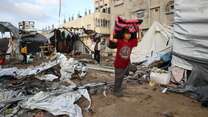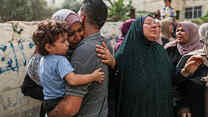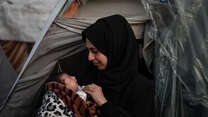
As nighttime temperatures dip below 10°C (50°F), families in Gaza face the prospect of yet another unforgiving winter. Displaced by conflict and forced to live in makeshift shelters, many are without even the most basic essentials to keep warm or maintain their health.
This year, occupied Palestinian territory (oPt) has been ranked second on the International Rescue Committee’s (IRC) 2025 Emergency Watchlist, underscoring the severity of the region’s ongoing plight.
Freezing temperatures and inadequate shelter
Winter in Gaza is unforgiving. Families live in worn-out tents and temporary shelters that fail to protect against the cold, rain, and wind. With few materials entering Gaza, replacement supplies like blankets, warm clothing, and proper building materials are nearly impossible to come by. Many families are left to endure freezing nights without adequate warmth or shelter.

A growing health crisis
The cold weather is exacerbating an already dire health situation. Overcrowded shelters and a lack of clean water have led to outbreaks of communicable diseases, including respiratory infections, diarrhea, and jaundice.
Gaza’s health care system, already stretched to the brink, cannot keep up with the rising number of cases. The risk of epidemics is growing, putting children and vulnerable populations at even greater risk.
The inclusion of occupied Palestinian territory on the IRC’s Emergency Watchlist for 2025 highlights the region’s urgent need for global attention and support. Without immediate action, the humanitarian crisis will worsen, leaving millions at risk of malnutrition, illness, and displacement. The IRC continues to call for an immediate and lasting ceasefire as the best way to protect Palestinian lives and enable the release of the remaining hostages.
How is the IRC helping?
The International Rescue Committee (IRC) is on the ground, working with local partners to provide urgent assistance during the winter months. Key efforts include:
- Providing warm clothing as part of child protection and women’s empowerment programs.
- Delivering emergency medical care in Gaza’s few operational hospitals.
- Supporting malnutrition treatment and health services, focusing on children and families in shelters.
- Offering mental health and psychosocial support to help children cope with trauma.
These interventions are critical as families struggle to survive the combination of freezing temperatures, malnutrition, and illness.
How you can help
Winter adds another layer of hardship to a population already facing catastrophic conditions. Your donation can help the IRC continue providing lifesaving medical care, warm clothing, and support for children and families in Gaza and around the world.
Every contribution matters. Donate now to help families in Gaza and around the world survive this winter.



